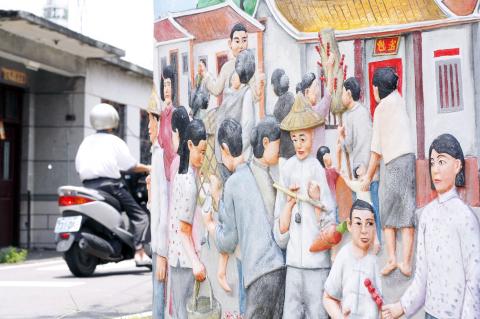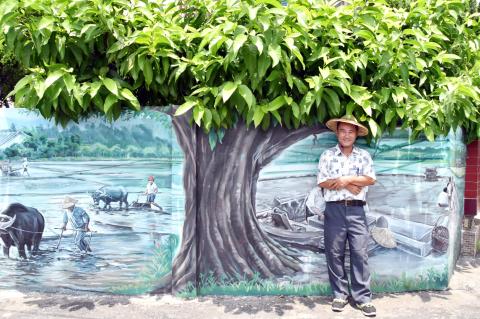Erlun Village in Pingtung County used to be the local township administration center during the Japanese colonial era, but that role was later replaced by Jhutian Village, ending Erlun’s days of glory. Erlun villagers became more and more closed-minded. For years, weeds grew along the walls and corners of the village. People stopped caring about one another and allowed even the most inconsequential things to cause disputes.
Village Warden Li I-jen says that “Erlun,” when pronounced in Hakka, sounds like “argument.” It is quite common for Erlun villagers to have arguments or quarrels with one another over things like the neighbor’s dog barking too loudly, somebody’s car not being parked properly or someone’s weeds not being tidied up regularly. These disputes could even end up in a mediation committee. In his nearly 10 years as village warden, Li’s highest record is settling four disputes in one day.
Since the community development association obtained funds and invited artists to work in the village, 10 walls of various sizes have been redesigned, and the originally bleak corners have also been brightened up with lively colorful paintings.

Photo: Chiu Chih-jou, Liberty Times
照片:自由時報記者邱芷柔
The murals in Erlun Village mostly depict bustling scenes from the village’s past and life in the countryside. Li said that not only has the village recently seen more tourists visiting, but the villagers also have started helping each other. Mediation cases have been greatly reduced, as if the murals had brought out shared memories that join people together, he says.
(Liberty Times, translated by Ethan Zhan)

Photo: Chiu Chih-jou, Liberty Times
照片:自由時報記者邱芷柔
屏東縣二崙村在日治時代前是當地的行政中心,後來行政中心轉往現在的竹田村,二崙村繁榮景象不再,村民越來越封閉,多年來社區牆面、角落都雜草叢生,大家自掃門前雪,連芝麻小事都要計較。
二崙村村長李毅仁說,「二崙」的客家話與「議論」發音相同,而住在二崙村的村民常有議論、紛爭情形,隔壁的狗太吵、車子沒停好、雜草沒整理都能鬧上調解會,他當村長近十年期間,最高紀錄一天就要處理四件調解案。
經過社區發展協會爭取經費,邀請藝術家下鄉後,目前社區有十面大小不一的牆面被換上新裝,原本黯淡的角落也因為生動活潑的彩繪變得明亮。
二崙村內的壁畫,多以描繪二崙村過去繁榮景象與農村生活為主。李毅仁說,最近不僅觀光客變多了,村民也開始互相幫忙,調解案件量大大減少,就像是壁畫牽起大家共同記憶一樣。
(自由時報記者邱芷柔)

A ‘Dutch angle’ is a classic camera technique that has been used in filmmaking since the 1920s, when it was introduced to Hollywood by German Expressionists. Why is it called the Dutch angle if it’s actually German? In fact, it has no __1__ to the Netherlands. The term “Dutch” is widely believed to be a misinterpretation of “Deutsch,” which means German in the German language. In any event, the name stuck, and the Dutch angle remains a popular cinematic tool to this day. This technique involves tilting the camera on its x-axis, skewing the shot to create a sense of

A: After holding nine concerts in Kaohsiung and Taipei recently, “God of Songs” Jacky Cheung will stage three extra shows later this week. B: They’re compensation for the three shows he postponed last year due to illness. A: He also canceled three more shows in Guangzhou last month. His health is worrisome. B: When touring Guangzhou, he dedicated his hit “She Is Far Away” to late singer Khalil Fong. That’s so touching. A: Online music platform KKBOX has also launched a campaign to pay tribute to Fong. I can’t believe he died so young: he was only 41. A:

A: After “God of Songs” Jacky Cheung sang for late singer Khalil Fong recently, music streaming service KKBOX also paid tribute to Fong by releasing his greatest hits online. B: The 20th KKBOX Music Awards ceremony is taking place at the K-Arena in Kaohsiung tomorrow. Fong performed at the ceremonies in the past. A: Who are the performers this year? B: The performers include Taiwanese groups 911, Wolf(s), Ozone, Singaporean pop diva Tanya Chua, and K-pop group Super Junior. A: South Korean stars actually took four spots among KKBOX’s 2024 Top 10 singles, showing that K-pop is still

Dos & Don’ts — 想想看,這句話英語該怎麼說? 1. 能做的事都做了。 ˇ All that could be done has been done. χ All that could be done have been done. 註︰all 指事情或抽象概念時當作單數。例如: All is well that ends well. (結果好就是好。) All is over with him. (他已經沒希望了。) That’s all for today. (今天到此為止。) all 指人時應當作複數。例如: All of us are interested in his proposal. All of us are doing our best. 2. 我們這麼做有益於我們的健康。 ˇ What we are doing is good for our health. χ What we are doing are good for our health. 註︰以關係代名詞 what 引導的作為主詞的子句,動詞用單數。如: What he said is true. 3. 大家都沿著步道跑。 ˇ Everybody runs along the trail. χ Everybody run along the trail. 註︰everyone 是指一大群人,但在文法上一般用單數。 4. 桌上有一本筆記本和兩支筆。 ˇ There were two